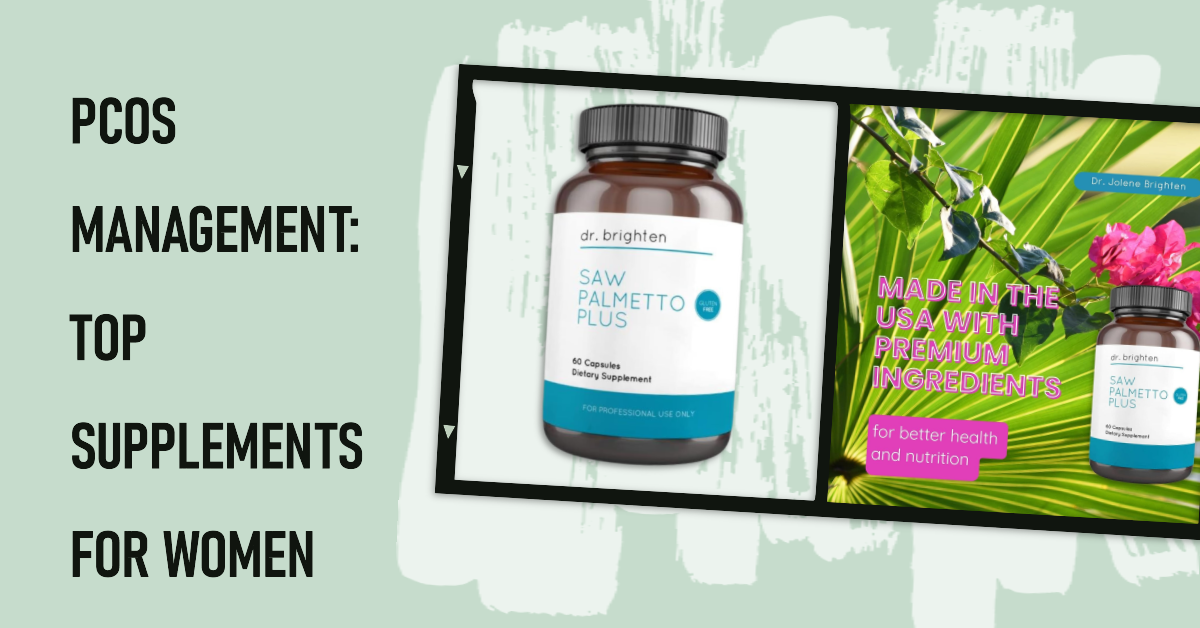Introduction
So you’ve been diagnosed with PCOS, and you’re wondering what steps you can take to manage it effectively? Look no further, because in this article, we’re going to unveil the top supplements for women in PCOS management. Living with PCOS can be challenging, but by incorporating these supplements into your daily routine, you can potentially alleviate symptoms, balance hormone levels, and improve overall wellbeing. From inositol to vitamin D, we’ll explore the benefits and dosages of these powerful supplements that may just be the missing piece in your PCOS puzzle. Let’s dive in!
Vitamin D
Benefits of Vitamin D for PCOS
Vitamin D has been shown to play a crucial role in the management of PCOS (Polycystic Ovary Syndrome). It helps regulate insulin levels, which is important for women with PCOS as they often have insulin resistance. By improving insulin sensitivity, vitamin D can aid in weight management and reduce the risk of developing diabetes. Additionally, vitamin D has been found to support ovarian function and promote regular menstrual cycles, both of which are disrupted in women with PCOS.
Recommended Dosage
The recommended daily intake of vitamin D for women with PCOS is 1,000 to 2,000 IU (International Units). However, it is always advisable to consult with your healthcare provider to determine the appropriate dosage for your specific needs.
Potential Side Effects and Precautions
When taken within the recommended dosage range, vitamin D is generally considered safe for most individuals. However, excessive intake of vitamin D can lead to toxicity, which may cause symptoms such as nausea, vomiting, and weakness. It is important to follow the recommended dosage and consult with your healthcare provider to ensure safe and effective supplementation.
Inositol
Benefits of Inositol for PCOS
Inositol, also known as vitamin B8, has been found to be beneficial for women with PCOS. It helps improve insulin sensitivity and can help regulate blood sugar levels, which is crucial for managing the insulin resistance commonly seen in PCOS. By regulating insulin, inositol may also contribute to weight management. Moreover, inositol has been shown to promote ovulation and support hormonal balance, thus addressing some of the underlying causes of PCOS.
One of the key challenges in managing PCOS is ensuring that your body receives the right nutrients to balance hormonal levels. This supplement has been specifically formulated to address the unique needs of women with PCOS. It contains a blend of essential vitamins and minerals that support hormonal balance, improve insulin sensitivity, and promote overall reproductive health. By incorporating this supplement into your daily routine, you can take a proactive step towards managing your PCOS symptoms and improving your well-being. Click To Learn More.
Recommended Dosage
The recommended daily dosage of inositol for women with PCOS is typically around 2,000 to 4,000 mg. However, it is important to consult with your healthcare provider to determine the appropriate dosage for your specific needs, as individual requirements may vary.
Potential Side Effects and Precautions
Inositol is generally well-tolerated with minimal side effects. However, some individuals may experience mild gastrointestinal symptoms such as nausea or diarrhea. If you experience any adverse effects, it is important to reduce the dosage or discontinue use and consult with your healthcare provider.
Chromium
Benefits of Chromium for PCOS
Chromium is a trace mineral that plays a crucial role in insulin metabolism, making it beneficial for women with PCOS. It helps improve insulin sensitivity and aids in regulating blood sugar levels, thus contributing to better management of insulin resistance. By supporting insulin function, chromium may help reduce cravings for carbohydrates and support weight management, which are common challenges for women with PCOS.
Recommended Dosage
The recommended daily dosage of chromium for women with PCOS is typically around 200 to 1,000 mcg (micrograms). However, it is important to consult with your healthcare provider to determine the appropriate dosage for your specific needs.
Potential Side Effects and Precautions
Chromium supplementation is generally safe when taken within the recommended dosage range. However, high doses of chromium may cause mild gastrointestinal symptoms such as stomach pain or diarrhea. In rare cases, excessive chromium intake may lead to more serious side effects, such as kidney damage. Therefore, it is important to follow the recommended dosage and consult with your healthcare provider before starting chromium supplementation.
Omega-3 Fatty Acids
Benefits of Omega-3 Fatty Acids for PCOS
Omega-3 fatty acids, particularly EPA (eicosapentaenoic acid) and DHA (docosahexaenoic acid), have been shown to have numerous health benefits, including their potential role in managing PCOS. Omega-3 fatty acids have anti-inflammatory properties, which can help reduce inflammation associated with PCOS. They have also been found to support hormone balance, regulate menstrual cycles, and improve ovulation. Additionally, omega-3 fatty acids may contribute to weight management, cardiovascular health, and overall well-being.
Recommended Dosage
The recommended daily dosage of omega-3 fatty acids for women with PCOS is typically around 1,000 to 2,000 mg, with a higher emphasis on EPA and DHA content. It is important to choose a reputable brand of fish oil or omega-3 supplement and consult with your healthcare provider to determine the appropriate dosage for your specific needs.
Another essential supplement for women with PCOS is this product. Rich in natural ingredients known to support ovarian health and regulate menstrual cycles, it’s a must-have for those looking to manage their PCOS symptoms naturally. Its unique formulation not only aids in hormonal balance but also provides the body with antioxidants that combat inflammation, a common issue in PCOS. For a holistic approach to PCOS management, consider adding this supplement to your regimen. Click To Learn More.

Potential Side Effects and Precautions
Omega-3 fatty acid supplementation is generally considered safe for most individuals. However, high doses may increase the risk of bleeding in individuals on blood-thinning medications. It is important to consult with your healthcare provider, especially if you are taking any medications or have any underlying health conditions, before starting omega-3 fatty acid supplementation.
Magnesium
Benefits of Magnesium for PCOS
Magnesium is an essential mineral that plays a vital role in various functions within the body, making it beneficial for women with PCOS. It has been found to help regulate insulin sensitivity and blood sugar levels, thus supporting the management of PCOS-related insulin resistance. Additionally, magnesium may help reduce inflammation and oxidative stress, which are often elevated in women with PCOS. It can also support hormone balance and contribute to a regular menstrual cycle.
Recommended Dosage
The recommended daily dosage of magnesium for women with PCOS is typically around 300 to 400 mg. However, it is important to consult with your healthcare provider to determine the appropriate dosage for your specific needs, as individual requirements may vary.
Potential Side Effects and Precautions
When taken within the recommended dosage range, magnesium is generally well-tolerated with minimal side effects. However, high doses of magnesium may cause gastrointestinal symptoms such as diarrhea. It is important to follow the recommended dosage and consult with your healthcare provider before starting magnesium supplementation, especially if you have any pre-existing gastrointestinal conditions.
N-acetyl Cysteine (NAC)
Benefits of N-acetyl Cysteine for PCOS
N-acetyl cysteine (NAC) is a powerful antioxidant that has shown promising benefits for women with PCOS. It helps regulate insulin levels and improve insulin sensitivity, which is important for managing the insulin resistance commonly seen in PCOS. NAC has also been found to support ovulation and improve fertility in women with PCOS. Additionally, it may help reduce inflammation, improve hormone balance, and support overall reproductive health.
Recommended Dosage
The recommended daily dosage of N-acetyl cysteine for women with PCOS is typically around 1,200 to 2,400 mg. However, it is important to consult with your healthcare provider to determine the appropriate dosage for your specific needs.
Potential Side Effects and Precautions
N-acetyl cysteine is generally well-tolerated with minimal side effects. However, some individuals may experience mild gastrointestinal symptoms such as nausea or diarrhea. If you experience any adverse effects, it is important to reduce the dosage or discontinue use and consult with your healthcare provider.
Another essential supplement for women with PCOS is this product. Rich in natural ingredients known to support ovarian health and regulate menstrual cycles, it’s a must-have for those looking to manage their PCOS symptoms naturally. Its unique formulation not only aids in hormonal balance but also provides the body with antioxidants that combat inflammation, a common issue in PCOS. For a holistic approach to PCOS management, consider adding this supplement to your regimen. Click To Learn More.

Image: Amazon
Vitex
Benefits of Vitex for PCOS
Vitex, also known as chasteberry, is a popular herbal supplement that has been used for centuries to address various hormonal imbalances. It has been found to help regulate menstrual cycles and support ovulation, making it beneficial for women with PCOS. Vitex may also alleviate some of the symptoms of PCOS, such as acne, hirsutism (unwanted hair growth), and mood swings. Additionally, it may support progesterone production and hormone balance.
Recommended Dosage
The recommended daily dosage of vitex for women with PCOS is typically around 300 to 500 mg. However, it is important to consult with your healthcare provider to determine the appropriate dosage for your specific needs.
Potential Side Effects and Precautions
Vitex is generally well-tolerated with minimal side effects. However, some individuals may experience mild gastrointestinal symptoms or headache. It is important to consult with your healthcare provider before starting vitex supplementation, especially if you are taking any medications or have any underlying health conditions.
Any Questions🤔?
Reach out to us! We’re here to clarify and prioritize your well-being. 🌟
Probiotics
Benefits of Probiotics for PCOS
Probiotics are beneficial bacteria that can support gut health, immune function, and overall well-being. They have been found to be beneficial for women with PCOS by improving insulin sensitivity, reducing inflammation, and supporting hormonal balance. Probiotics can also contribute to digestive health, alleviate gastrointestinal symptoms, and promote a healthy weight.
Recommended Dosage
The recommended daily dosage of probiotics for women with PCOS may vary depending on the specific strains and formulations. It is important to choose a reputable brand of probiotics and consult with your healthcare provider to determine the appropriate dosage for your specific needs.
Potential Side Effects and Precautions
Probiotics are generally safe for most individuals. However, some individuals may experience mild gastrointestinal symptoms such as bloating or gas when starting probiotic supplementation. These symptoms typically resolve on their own within a few days. If you experience any adverse effects or have any underlying health conditions, it is important to consult with your healthcare provider before starting probiotic supplementation.
Berberine
Benefits of Berberine for PCOS
Berberine is a plant compound that has been used in traditional medicine for its various health benefits. It has been found to improve insulin sensitivity and regulate blood sugar levels, making it beneficial for women with PCOS. Berberine may also help reduce weight gain, support hormone balance, and enhance fertility. Additionally, it has anti-inflammatory and antioxidant properties, which can help reduce inflammation in women with PCOS.
Recommended Dosage
The recommended daily dosage of berberine for women with PCOS is typically around 1,500 to 2,000 mg. However, it is important to consult with your healthcare provider to determine the appropriate dosage for your specific needs.
Potential Side Effects and Precautions
Berberine is generally well-tolerated with minimal side effects. However, some individuals may experience mild gastrointestinal symptoms such as diarrhea. It is important to follow the recommended dosage and consult with your healthcare provider before starting berberine supplementation, especially if you have any pre-existing gastrointestinal conditions or are taking any medications.
Zinc
Benefits of Zinc for PCOS
Zinc is an essential mineral that plays a crucial role in various functions within the body, including hormone regulation and immune function. It has been found to be beneficial for women with PCOS by supporting insulin sensitivity and reducing inflammation. Zinc may also contribute to hormone balance, regulate menstrual cycles, and improve fertility. Additionally, it has antioxidant properties, which can help protect against oxidative stress commonly seen in women with PCOS.
PCOS can often lead to metabolic issues, making it crucial to support your body with the right nutrients. This supplement offers a comprehensive solution, targeting both hormonal imbalances and metabolic health. With ingredients known to enhance insulin function and reduce insulin resistance, it’s an excellent choice for women who want to tackle the root causes of PCOS. Experience the difference in energy levels, mood, and overall health by integrating this supplement into your daily routine. Click To Learn More.

Recommended Dosage
The recommended daily dosage of zinc for women with PCOS is typically around 30 to 50 mg. However, it is important to consult with your healthcare provider to determine the appropriate dosage for your specific needs.
Potential Side Effects and Precautions
Zinc supplementation is generally safe when taken within the recommended dosage range. However, high doses of zinc may interfere with the absorption of other minerals and may cause gastrointestinal symptoms such as nausea or stomach cramps. It is important to follow the recommended dosage and consult with your healthcare provider before starting zinc supplementation, especially if you have any underlying health conditions or are taking any medications.
FAQ (Frequently Asked Question)
Q: What is PCOS and how does it affect women?
A: PCOS, or Polycystic Ovary Syndrome, is a hormonal disorder common among women of reproductive age. Women with PCOS may have infrequent or prolonged menstrual periods or excess male hormone (androgen) levels. This can lead to irregular periods, acne, thinning hair, and the development of ovarian cysts.
Q: How can supplements help in managing PCOS?
A: Supplements can provide essential nutrients that may be deficient in women with PCOS. They can help in balancing hormones, improving insulin sensitivity, and reducing inflammation, which are critical factors in managing PCOS symptoms.
Q: Are there any side effects of taking these supplements?
A: While most supplements are generally safe, it’s essential to consult with a healthcare professional before starting any new supplement. Some individuals might experience mild side effects depending on the ingredients and their body’s reaction.
Q: How long should I take these supplements for noticeable results?
A: The duration varies from person to person and depends on the supplement’s ingredients. However, most women start noticing improvements within 3-6 months of consistent use.
Q: Can I take these supplements alongside other medications?
A: It’s crucial to consult with your healthcare provider before combining supplements with other medications. They can provide guidance on potential interactions and ensure your safety.
Conclusion
Various supplements can be beneficial for women with PCOS in managing their symptoms and promoting overall well-being. Vitamin D, inositol, chromium, omega-3 fatty acids, magnesium, N-acetyl cysteine, vitex, probiotics, berberine, and zinc have all shown promise in improving insulin sensitivity, regulating menstrual cycles, supporting hormone balance, reducing inflammation, and addressing other underlying factors contributing to PCOS. However, it is essential to consult with your healthcare provider before starting any supplements to determine the appropriate dosages and ensure they are safe and suitable for your individual needs. Incorporating these supplements into a comprehensive PCOS management plan, alongside a healthy diet and lifestyle, can help women with PCOS take control of their health and well-being.




